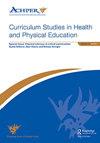‘Publicness of education’: framing possibilities for decolonising practices in Health and Physical Education
IF 2.1
Q2 EDUCATION & EDUCATIONAL RESEARCH
Curriculum Studies in Health and Physical Education
Pub Date : 2023-10-25
DOI:10.1080/25742981.2023.2272143
引用次数: 0
Abstract
Calls have been made for a public pedagogy that works at the intersection of education and politics to enact a concern for publicness. These are calls for pedagogy that values plurality in human togetherness and educational conditions in which all young people can flourish. In this paper my specific focus is exploring how publicness of education can be conceived in relation to encouraging inclusive, equitable and decolonial ‘ways of being doing and knowing' in HPE. I adopt a genealogical approach to explore ‘conditions of possibility' that have contributed to durability of a ‘white' Eurocentric norm for HPE. Selected reports, curriculum documents, newspaper and reference articles are drawn on to illuminate discourses, and power relations implicated in this dominant framing. This paper represents an attempt to disrupt common sense understandings and practices of HPE founded settler-colonialism and new forms of neo-liberal colonialism. Approaches premised on activist, culturally responsive pedagogies as well as affective, embodied, relational dimensions of human togetherness are suggested. I propose that questioning ‘why' ‘how' and ‘what' is taught in HPE is critical for reframing ‘thinking and feeling’ required for pedagogical and curricular practices that can enhance educational justice for Indigenous students."教育的公共性":为保健和体育非殖民化做法提供可能性
人们呼吁在教育和政治的交叉点建立一种公共教育学,以制定一种对公共性的关注。这是对重视人类团结的多元性和所有年轻人都能蓬勃发展的教育条件的教育方法的呼吁。在本文中,我的重点是探索如何将教育的公共性与鼓励包容、公平和非殖民化的HPE“做事和认识的方式”联系起来。我采用了一种谱系的方法来探索“可能性条件”,这些条件促成了惠普“白人”欧洲中心规范的持久性。选定的报告、课程文件、报纸和参考文章被用来阐明话语,以及在这种主导框架中涉及的权力关系。本文试图打破惠普创立的定居者殖民主义和新自由主义殖民主义的常识理解和实践。方法的前提是积极的,文化响应教学法以及人类团结的情感,具体化,关系维度。我提出质疑“为什么”、“如何”和“什么”在HPE中教授是至关重要的,这对于重新构建教学和课程实践所需的“思考和感觉”至关重要,这些实践可以增强土著学生的教育公正。
本文章由计算机程序翻译,如有差异,请以英文原文为准。
求助全文
约1分钟内获得全文
求助全文
来源期刊

Curriculum Studies in Health and Physical Education
Social Sciences-Education
CiteScore
3.00
自引率
10.50%
发文量
33
 求助内容:
求助内容: 应助结果提醒方式:
应助结果提醒方式:


